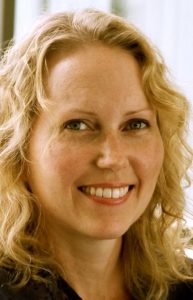
What is your scientific background?
I earned my Ph.D., with a teaching designation, in Immunology from the University of Alberta, Canada. I then conducted my postdoctoral research at Washington University School of Medicine in St Louis and NYU School of Medicine where I studied T cell motility and immunological synapse formation. During my training, I was fortunate to author numerous articles and also receive independent funding for my Ph.D. studies and postdoctoral fellowship, including a seed grant from the National Psoriasis Foundation.
How did you transition from the lab to your current job?

During my Ph.D., I completed work and certifications to obtain a teaching designation. Following on that interest in education, and while doing my postdoctoral research, I started the ‘Future Science Educators’ at NYU with a few colleagues, an initiative to help early career scientists teach science more effectively. This group really taught me what an amazing amount of good energy comes from working as a focused group..
While doing my post-doc, I was privileged to work on a large multi-national NIH Center grant, where I learned the power and excitement of working in a multi-lab/multi-national team to answer important scientific questions. Earlier in my career, I also led a large team for several years in the forestry industry. These combined experiences in team approaches to science, team leadership, strategy and operations gave me the experience and drive to start my professional career as a program manager.
I loved the lab, but I wanted to drive big science projects that one cannot easily do as an individual lab leader. I also wanted to explore other parts of my skill set, so I started to explore options. Through volunteering with the Future Science Educators group, I’d met and worked with a large number of other groups. Through those connections, I found my way to the non-profit sector as a scientific program manager for the JDRF.
I loved the lab, but I wanted to drive big science projects that one cannot easily do as an individual lab leader.
From there, I moved to Regeneron into research program management. Through working with many functions at Regeneron, I was able to see what groups and work might be interesting, and where I could contribute in another way. It was after this that I decided to contribute my scientific knowledge to clinical trial design and implementation. I joined the clinical oncology team as a clinical scientist to work on our biomarkers projects and then started to work on our immune-oncology clinical studies.
How do you spend your day in your job?
Previously, in the Program Management group at Regeneron, I was responsible for driving oncology strategic projects; leading project teams; and providing programmatic oversight of oncology research, new protein technologies, and research in support of oncology clinical programs.
As a clinical scientist in the Oncology Clinical Sciences team at Regeneron, I’m responsible for developing and implementing several oncology clinical studies for Regeneron’s Immune-Oncology portfolio. I work closely with a cross-functional team to move all of our projects forward. I was previously responsible for developing and leading our translational sciences efforts to identify new oncology indications and for leading our efforts to develop disease-profiling capabilities to provide prognostic and/or predictive markers in clinical trials.
I use my immunology training all the time as a clinical scientist on immune oncology programs.
My current responsibilities are varied and at the moment, the top 3 things on my list today are: to work with team to develop our plans for our European and Japanese programs, to complete protocol for a new phase 1 study and finally to review a concept sheet from potential partners.
I use my immunology training all the time as a clinical scientist on immune oncology programs. I spend about 50% of my time in meetings with internal and external cross-functional team members, and the rest of the time developing and reviewing materials for our programs.
Materials that I develop or review include: slide decks to communicate our program strategy or the research we have completed on new indications; concept sheets to communicate the concept and strategy of an upcoming program to a new and broader audience; and clinical study protocols and other study-specific materials like informed consent forms, clinical site training materials, communications with regulatory authorities, etc.
What do you like most about your job?
I love working with a world-wide team of talented professionals, involved in complex projects and programs. We work across disciplines, across companies and across cultures. I find it fascinating how all the groups come together to develop and provide medicines to patients.
Coming from research and academia, I’ve loved learning about all functions at the company and how they contribute to answering complex basic, translational and clinical scientific questions.
Do you have any advice for current graduate students and postdocs looking to move out of the lab?
Work productively with as many different people as you can, doing as many different kinds of things as you can. Publish as well as you can and if you have an idea about what you might want to do outside of the lab, talk to people doing that and identify the steps you could take to get where they are. You may need to develop other expertise areas, which can be done by taking classes or working/volunteering in that area. If you do not have an idea of what you may want to do, attend career fairs and networking events and talk to as many people as you can about their careers and career paths.
Join the conversation by commenting below or using the #moretoscience hashtag on twitter. Do you have a job in science that you love, or know someone who does? Contact me at dana.berry@biomedcentral.com or @DanaBerryBMC if you’re interested in participating in our series.
Comments